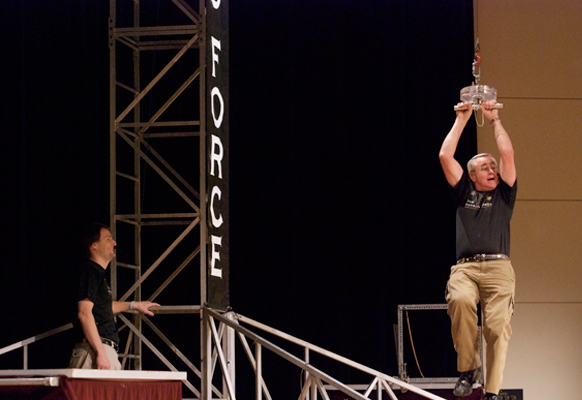What Happens
This demonstration uses a Magdeburg Hemisphere to attach a cable to a heavy frame. A Magdeburg Hemisphere is a device with two halves, held together by air pressure. One of the force members will draw the air out of the device and the seal will be strong enough to support a person's weight, swinging on the frame.
How it Happens
The average person can, using thier mouth and lung power, draw a small volume of air down to about one half as much pressure as normal atmospheric pressure. This means approximately 7 to 8 pounds per square inch. The normal atmosphere has about 15 pounds per square inch. Now with the area of the two disks being approximately 70 to 80 square inches, the difference in pressure produces about 500 pounds of force tending to hold the two disks together. Thus, the person would have to weigh about 500 pounds to pull the two disks apart using thier weight!
Vocabulary
Magdeburg: A city in Germany where a scientist first demonstrated the large amount of air pressure that we all live in. It was done by removing the air from between two large hemispheres that were sealed air tight and then two teams of horses were engaged to try to pull them apart. Having not been able to do it with the horses, the scientist then walked over to the hemispheres, opened a valve to let air back into the cavity between the hemispheres and they fell apart. We will be doing a similar type of activity using plexiglass disks which we will call Magdeburg Disks.
atmospheric pressure: This is also the pressure caused by air, but usually thought of as the normal value or standard value of 14.7 pounds per square inch. The atmospheric pressure at the place where we are on the face of the earth is usually less than this because we are above sea level, and hence have less "weight" pushing down on us. Again, used with the same activities as air pressure.
pressure: In the context of our show, it will be the number of pounds per square inch exerted by gaseous molecules. When the number of pounds per square inch are multiplied by the number of square inches on an object, it is possible to determine the total force, the push on the object.
vacuum: A space where there is no pressure, usually caused by the lack of any molecules. A totally empty space is another way of describing it. We will be talking about the partial vacuum produced by several situations which we will create. Thus, in our partial vacuum, there will be very low pressure but perhaps not a totally empty space.
